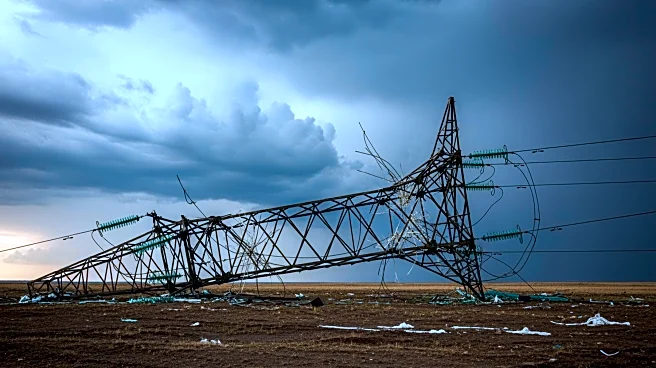What's Happening?
Kyiv and surrounding regions are experiencing emergency power outages after a large-scale Russian attack targeted Ukraine's energy and gas infrastructure. The attack, which occurred overnight on November
8, involved the launch of 458 drones and 45 cruise and ballistic missiles by Russia. Ukrainian forces managed to down 406 drones and nine missiles. The cities of Kremenchuk, Kyiv, Dnipro, Kharkiv, and Chernihiv were primary targets, with explosions also reported in Sumy and Odesa Oblast. President Volodymyr Zelensky described the strike as demonstrative and noted Ukraine's efforts to acquire additional Patriot air defense systems from the U.S. The state grid operator, Ukrenergo, implemented emergency power cuts, and DTEK, Ukraine's largest private energy company, reported significant damage to one of its thermal power plants. Energy Minister Svitlana Hrynchuk stated that the attack was one of the largest direct ballistic missile attacks on energy facilities since the invasion began.
Why It's Important?
The attack underscores the ongoing vulnerability of Ukraine's energy infrastructure amidst the conflict with Russia. The strategic targeting of energy facilities aims to disrupt Ukraine's power supply, potentially leading to severe consequences for civilians and the economy, especially as winter approaches. The repeated attacks on energy infrastructure highlight the need for Ukraine to bolster its air defense capabilities, as evidenced by its collaboration with the U.S. to acquire Patriot systems. The situation also emphasizes the resilience of Ukraine's energy sector, which has faced over 210 attacks on DTEK power plants alone. The broader impact includes potential humanitarian challenges, as prolonged power outages could affect heating, communication, and essential services.
What's Next?
Ukraine is likely to continue strengthening its air defense systems with international support, particularly from the U.S. The government and energy companies will focus on repairing and stabilizing the power grid to minimize disruptions. Emergency crews are working to restore parts of the grid, and normal outages are expected to resume once the situation stabilizes. The ongoing conflict may lead to further attacks on infrastructure, prompting Ukraine to enhance its defensive measures and seek additional international aid. The resilience and adaptability of Ukraine's energy sector will be crucial in mitigating the impact of future strikes.
Beyond the Headlines
The attacks on energy infrastructure highlight the ethical and humanitarian dimensions of warfare, where civilian infrastructure becomes a target, affecting non-combatants. The situation raises questions about the legality of such attacks under international law and the long-term implications for Ukraine's reconstruction efforts post-conflict. The resilience shown by Ukraine's energy sector could serve as a model for other nations facing similar threats, emphasizing the importance of strategic planning and international cooperation in safeguarding critical infrastructure.











